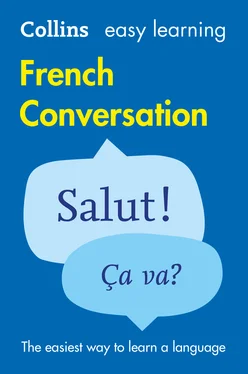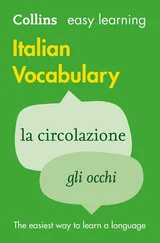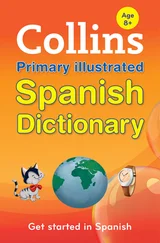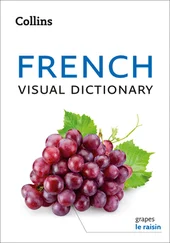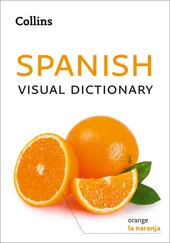1 ...8 9 10 12 13 14 ...18
| Est-ce que je peuxpayer par carte bleue? |
Can Ipay by debit card? |
| Est-ce que je peuxlouer une voiture pour la journée? |
Can Ihire a car for the day? |
| Est-ce qu’on peutfumer dans le train? |
Issmoking allowedon the train? |
| Est-ce qu’on peuty aller à pied? |
Can youwalk there? |
| Est-ce qu’il est possible dechanger son billet par Internet? |
Can youchange your ticket online? |
When asking for something, you can use Est-ce que je peux avoir…?( Can I have…? ) or Est-ce que je pourrais avoir…?( Could I have…? ). These come from the verb pouvoir.For more information on pouvoir,see here.
| Est-ce que je peux avoirun plan du métro, s’il vous plaît? |
Can I havea map of the underground, please? |
| Est-ce que je peux avoirune carte à la semaine, s’il vous plaît? |
Can I havea weekly pass, please? |
| Est-ce que je pourrais avoirles horaires des trains, s’il vous plaît? |
Could I havea train timetable, please? |
When you want to find out if something is available or if someone has something, use Est-ce que vous avez…?or Vous avez…?( Do you have…? ). avezcomes from the verb avoir.For more information on avoir,see here.
| Est-ce que vous avezles horaires des bus? |
Do you haveany bus timetables? |
| Vous avezun plan d’accès, s’il vous plaît? |
Do you havea map that shows how to get there, please? |
| Vous avezdes voitures plus petites en location? |
Do you havesmaller cars to hire? |
| Est-ce qu’il vous restedes places côté couloir? |
Do you haveany aisle seats left? |
When you ask for something, you can simply name what you want, but make sure you finish your question with s’il vous plaît,or your request might sound rather like an order!
| Unaller simple, s’il vous plaît. |
Asingle, please. |
| Uneplace côté fenêtre, s’il vous plaît. |
Awindow seat, please. |
| Troisbillets retours pour Montréal, s’il vous plaît. |
Threereturns to Montreal, please. |
If you are asking someone if they can do something for you, you should use Est-ce que vous pouvez…?( Can you…? ).
| Est-ce que vous pouveznous emmener à l’hôtel Saint-Antoine, s’il vous plaît? |
Can youtake us to the Saint-Antoine hotel, please? |
| Est-ce que vous pouvezme prévenir quand on arrivera à l’arrêt du musée? |
Can youtell me when we’re near the museum stop? |
| Vous pouvezme déposer ici, s’il vous plaît? |
Can youdrop me here, please? |
| Vous pouveznous montrer où ça se trouve sur la carte? |
Can youshow us where it is on the map? |
| Est-ce que ça vous dérangerait dem’écrire l’adresse? |
Would you mindwriting down the address for me? |
| Est-ce que ça vous dérangerait deme déposer à mon hôtel? |
Would you minddropping me at my hotel? |
| Est-ce que ça vous dérangerait denous montrer où c’est? |
Would you mindshowing us where it is? |
SAYING WHAT YOU LIKE, DISLIKE, PREFER
You will want to be able to discuss what you like and dislike with your French-speaking acquaintances. To say what you like, use j’aime bien( I like ), which is not as strong as j’aime( I love ). To say what you don’t like, just use je n’aime pas( I don’t like ). These come from the verb aimer.For more information on aimer,see here.
| J’aime biences routes de campagne. |
I like thesecountry roads. |
| J’aime bienvoyager en train. |
I liketravelling by train. |
| J’aime beaucoupcette voiture. |
I likethis car a lot. |
| J’aimel’avion. |
I loveflying. |
| Je n’aime pasles voitures automatiques. |
I don’t likeautomatics. |
| Je n’aime pasconduire à droite. |
I don’t likedriving on the right. |
| Tu aimes biencette région? |
Do you likethis area? |
| Tu aimes bienvoyager seul? |
Do you liketravelling by yourself? |
| Est-ce que vous aimezconduire de nuit? |
Do you likedriving at night? |
| Est-ce que vous aimez bienles voyages organisés? |
Do you likepackage tours? |
If you want to say what you prefer, use je préfère( I prefer ) or je préférerais( I’d prefer ). These come from the verb préférer.For more information on -erverbs like préférer,see here.
| Je préfèredormir à l’hôtel. |
I prefer tosleep in a hotel. |
| Je préfèreprendre l’autoroute. |
I prefer totake the motorway. |
| Je préféreraisne pas laisser ma voiture ici. |
I’d prefernot toleave my car here. |
| J’aimerais mieuxfaire le voyage par beau temps. |
I’d rathermake the journey in good weather. |
| J’aimerais mieuxêtre assise côté fenêtre. |
I’d rathersit next to the window. |
| On aimerait mieuxfaire la route de jour. |
We’d ratherdrive in the daytime. |
Читать дальше
